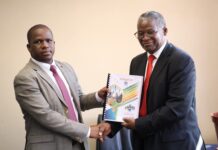A new forensic review commissioned by Swazipharm has cast doubt on the credibility of Funduzi Forensic Services’ investigation into the country’s drug shortage crisis, exposing major flaws in both the firm’s appointment and its conclusions.
The 92-page assessment, compiled by Randburg Chartered Accountants (RCA) and led by chartered accountant Paul Naude, questions not only the findings of Funduzi’s audit as per its abridged report tabled in Parliament by Minister for Finance Neal Rijkenberg last year, but also the legitimacy of the firm itself, which it highlights, appears to have operated under a web of shifting aliases and questionable registrations.
According to Swazipharm Director Kareem Ashraff, the review was commissioned after what he describes as a ‘systematic attack’ against him and his company in connection with the crippling shortage of medicines in the public health sector.
“This report is for anyone who still has questions,” Ashraff said.
“It sets out, in black and white, how my name has been dragged through the mud on social media for a crisis that is clearly produced. What Funduzi has presented as fact is riddled with errors, omissions and outright misrepresentations, yet taxpayers have been paying. Now the truth is out for everyone who wants to really find out,” he explained.
Questionable appointment
The RCA review is unambiguous in its conclusion, stating that Funduzi’s appointment to investigate the ministry of health’s procurement processes should never have happened, as the company’s credentials were questionable from the very beginning.
“It is apparent that both the appointment of Funduzi and their underlying basis for appointment was seriously flawed,” the report states.
It uncovered evidence that the firm relied on altered company documents, including tampered records lodged with the Companies and Intellectual Property Commission (CIPC) in South Africa.
The documents suggested that Funduzi was trading under the name of an established South African firm, Fundudzi Forensic Services (with a ‘d’), even though that company has publicly disassociated itself from any work in Eswatini.
Naude’s report further reveals that Funduzi had operated under at least three other aliases: DW Wealth Consultants (Pty) Ltd, DW Wealth Consulting Funduzi Forensic Services (Pty) Ltd, and FDZ Forensic (Pty) Ltd.
The shifting corporate identities, it concludes, raise “material concerns regarding independence, continuity and regulatory compliance.”
Flawed findings
Beyond the irregular appointment, the RCA assessment dismantles several of Funduzi’s headline findings.
One of the most damaging relates to so-called ‘duplicate’ payments. In a leaked version of the report, it was claimed that Swazipharm received double payments from government.
RCA’s review found that this conclusion stemmed from a basic misinterpretation of transaction records. In reality, the payments related to distinct consignments recorded under similar invoice numbers.
Most striking is the claim in Funduzi’s abridged report that government paid E9 million for Remdesivir allegedly donated by the World Health Organisation (WHO). That allegation has already been publicly refuted by WHO, which stated it never donated the drug to Eswatini.
RCA’s review underlines this contradiction, branding Funduzi’s conclusion “erroneous and unsupported by verifiable evidence.”
Breach of auditing standards
The RCA report also highlights a fundamental breach of auditing standards: Funduzi failed to give auditees a right of reply.
“Serious failings in the Funduzi approach resulted in erroneous conclusions and did not include an auditee right of reply,” it states.
Swazipharm confirmed that neither the company nor its executives were given a chance to clarify the allegations before the report was finalised and presented to government.
Such an omission, RCA says, contravenes international auditing norms, including the SAICA Code of Conduct, the ACFE Code of Professional Ethics, and the Eswatini Audit Act.
Procurement oversight questioned
Beyond Funduzi itself, the RCA review raises serious concerns about the procurement processes at the AG’s office that led to the engagement with Funduzi.
By allegedly accepting altered corporate records and overlooking inconsistencies in credentials, the report suggests that the AG’s office may have breached procurement legislation, including the Public Procurement Act of 2011.
“The central question is how such a firm was allowed to conduct an investigation of this magnitude in the first place. This points to systemic weaknesses in procurement oversight,” it states.
For Ashraff, this is the heart of the matter.
“Funduzi was brought in on a flawed process and their report was weaponised to paint me as the villain in a crisis that has been created by people with their own intentions. This so-called forensic audit by Funduzi was never about accountability; it was always about scapegoating,” he said.
Rising controversy
These findings land at a time when Funduzi’s engagement continues to draw criticism from multiple quarters.
As previously reported, the firm was initially paid E2.08 million for its assignment in 2023. Contract variations and additional payments have since pushed that figure to nearly E4 million, even as the public health crisis worsened.
Last month, Prime Minister Russell Mmiso Dlamini told Parliament that the Funduzi report was “a problem itself in terms of the standard” and “difficult to implement.”
Yet, in the same week, the auditor general’s office confirmed that it had re-engaged Funduzi for an ‘extension of scope’ relating to drug recalls and testing – a move that has fuelled further public concern.
Adding to the controversy are questions about Funduzi’s credibility. Its original lead investigator, Charles Kwezera, was dismissed after suspended Ministry of Health officials accused him of attempting to extort them in exchange for favourable findings. He was later arrested in South Africa on separate extortion charges.
Meanwhile, the directors of Fundudzi Forensic Services in South Africa, a prominent firm with which Funduzi appeared to conflate itself, confirmed they had never worked in Eswatini and had reported the matter to the Hawks and the CIPC.
“We have never worked in Eswatini and believe our company’s identity may have been misused,” the directors said.
Recommendations
The RCA report concludes with a set of recommendations, including:
-
A full investigation into Funduzi’s appointment.
-
Stricter vetting of forensic auditors and consultants engaged by government.
-
A formal right of reply process for all future audits.
-
Independent verification of evidence used in procurement investigations.








